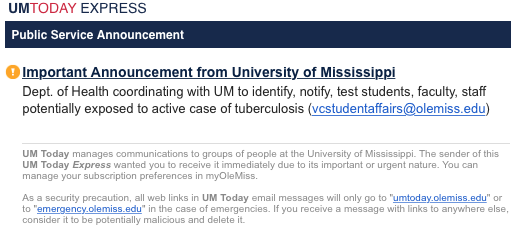Many members of the Ole Miss community were alarmed Monday after receiving emails notifying them of an active tuberculosis case on campus that hundreds of people were potentially exposed to.
In an initial email sent confidentially that morning, the university and Mississippi State Department of Health warned approximately 500 students, faculty and staff members that they may have been exposed to tuberculosis over the past school year.
“While attending or teaching classes at the University of Mississippi during the Fall 2017 and Spring 2018 semesters, you may have been exposed to an individual with active tuberculosis disease,” the UM Today message read.
Senior marketing and corporate relations major Brewer Spayde was one of the students who received that email.
“I was confused as to what was going on, since they did not give much information about what was happening,” Spayde said. “Then I was kind of scared because TB is not something to mess around with.”
Spayde said she and the other notified individuals will be tested free of charge Thursday at the Jackson Avenue Center. The university will cover all costs for the tests and any follow-up tests and treatment they may need.
 “The Mississippi State Department of Health will be collecting blood samples from students, faculty and staff believed to have been exposed to identify any individuals that may be infected,” the UM Today message said. “Those found to be infected will be further evaluated and offered treatment to help prevent the infection from progressing to active TB disease.”
“The Mississippi State Department of Health will be collecting blood samples from students, faculty and staff believed to have been exposed to identify any individuals that may be infected,” the UM Today message said. “Those found to be infected will be further evaluated and offered treatment to help prevent the infection from progressing to active TB disease.”
After a friend told him to check his email, junior accounting major Myles Seiple realized he had received the message alerting him that he should be tested.
“So I get on and notice I have two emails instead of one from the health services center,” Seiple said. “One containing general info about a potential outbreak and another that said ‘CONFIDENTIAL.’”
After logging into his myOleMiss account to view the message, he saw that he has possibly been exposed to tuberculosis.
“My initial thought was ‘Uh oh, looks like I got an early 20th-century problem on my hands,’” Seiple said. “Then I read more and had a few other thoughts, such as ‘I’m probably good.’”
Following the first notification emails, another email was sent out to the entire Ole Miss faculty and student body explaining that an active case of tuberculosis had been identified on campus.
The announcement garnered mixed reactions from the community, and social media was abuzz with student reactions ranging from serious concern to joking about the disease.
Sophomore hospitality management major Caroline Young said she and her friends didn’t take the email too seriously.
“It’s kind of bad because we weren’t that concerned about it. We probably should have been more concerned, but we were kind of laughing about it.” Young said.
Junior linguistics major Heath Wooten said that when a friend in class told him about active TB on campus, he said, “I’m more scared of meningitis.”
Wooten said that after researching tuberculosis, he was less concerned.
“It incubates forever,” Wooten said. “Now that people are aware, doctors can screen people and eliminate it before symptoms can emerge.”
The Mississippi State Department of Health released a document with information about TB. It explained the differences between tuberculosis infection and tuberculosis disease. Tuberculosis infection does not cause illness and has no symptoms, and people with the infection cannot spread it to others, so the 500 individuals being tested are not contagious.
If tuberculosis infection is detected, it can be treated to prevent active tuberculosis disease. If left untreated, it could develop over time into active tuberculosis disease, which displays symptoms like persistent coughing lasting two or more weeks, chest pains, difficulty breathing, chills, fever, coughing up blood, night sweats, feeling tired and weight loss.
The goal of testing the large group of students is to prevent any potential TB infection from becoming active TB disease.
“TB is a serious and potentially life-threatening disease, but it can be detected and treated before symptoms develop,” according to the message sent on UM Today.






